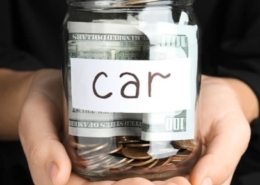Should I Finance a Car for 72 Months With Bad Credit?
With the recent rise in new and used car prices, I receive a lot of questions asking me if it’s okay to extend a car loan term to 72 months or more. And if it’s a good idea if they have bad credit.
Typically, the only reason someone would want to extend a loan term is so they can purchase a more expensive vehicle or make the monthly payment more affordable.
Quick Advice About 72 Month Bad Credit Auto Loans
If you are applying for a bad credit auto loan or have no credit, I highly recommend you stay with a 48-month auto loan term or less.
You can go with a 54, 60, or 72 months or more, but if you’re in bad credit or no credit situation, I advise you to put more money down and go with the shortest finance term possible.
The shorter the term, the more money you’ll save on finance charges or any additional fees. Dealers and lenders do not always provide you with this information when buying a new car.
Average Interest Rate for a 72 Month Auto Loan
At the beginning of 2021, the average interest rate for a new car loan was 4.06 percent, according to Experian’s State of the Automotive Finance Market. However, most people don’t know about this statistic because it’s for people with good to excellent credit (prime borrowers).
The difference in the interest rate on a 60 or 72-month loan is minimal for these car buyers. They may only pay between $400 to $600 more over the loan life but save anywhere between $50 to $100 a month on their car payment.
Another example of prime borrowers extending their term to 72 months is to get a lower payment but still pay more towards the principal every month. If their minimum monthly car payment is $400, they’ll pay $450 or more. The extra $50, or whatever the overage is, goes towards the principal. If they’re short one month, they only have to come up with a minimum of $400. This technique takes discipline but can save you money in the long run and pay off a vehicle quickly.
You can see where extending a car loan can sometimes actually benefit someone with excellent credit. But how does stretching an auto loan term affect someone with under-average (near-prime borrower) or bad credit (sub-prime borrower).
Extending an Auto Loan Term to 72 Months With Bad Credit
In May of 2021, the average new car transaction price was $41,263, and the average used car transaction price came in at $25,410. Even if a credit-challenged person buys a much cheaper vehicle, two ways are extending the loan term will be more expensive.
1) You agree to buy a car with a selling price of $17,500; you put down $1,500 and want to finance the remaining $16,000. You get approved for 15.99 percent and finance for 48 months. Your payment will be $453 a month with interest charges of $5,761 over the life of the loan.
In the above example, each additional year you stretch out the loan will add roughly another $1,440 in additional interest charges. If you extend the loan to 60 months, your payment will only be $389 a month, but your interest charges shoot up to $7,340. If you open the term to 72 months, your payment is $347 a month, and your interest charges are $8,983, over half of the vehicle’s selling price.
2) If you have bad credit, the second reason extending out a car loan term might cost you; the longer the vehicle is financed, the less it is worth. This means if you’ve achieved your goal and reestablished your credit after a couple of years.
You still will not be able to trade in the vehicle because you still owe way more than what the car is worth (upside down).
If you cannot come up with cash to compensate for the negative equity, you may be trapped in your vehicle, paying the higher rate, or risk messing up the credit you just worked so hard on reestablishing.
Suppose you’re in a below-average, bad credit, or no credit situation and not careful. You could pay more additional interest charges than a prime borrower would pay to finance the exact vehicle.
Learn how to increase your chances of being approved for a bad credit auto loan and what to expect if you have bad credit.
Visit my Auto Finance Tips Section to learn how dealers make money financing cars, how your credit report affects your interest rate, common auto finance mistakes, and more.
Current Average Interest Rates According to Experian
Interest rates are computed using various criteria, including the vehicle you’re purchasing, your credit score, and where you reside. You can obtain an auto loan via a dealership or pre-approvals from institutions such as banks, credit unions, or independent lenders.
| Credit Score | Average APR New | Average APR Used |
|---|---|---|
| Super Prime (781 to 850) | 14.66% | 21.07% |
| Prime (661 to 780) | 10.81% | 17.26% |
| Non-prime (601 to 660) | 6.64% | 10.43% |
| Subprime (501 to 600) | 3.54% | 5.54% |
| Deep Subprime (300 to 500) | 2.41% | 3.71% |
How to Improve Your Credit Situation
You can do numerous things to increase your chances of getting a better interest rate by improving your credit history.
Some of these actions, such as increasing your credit score, will take time, but every little bit helps. Ultimately, it all boils down to what a lender is prepared to provide you.
- Increase your down payment – If you increase the amount of money you put down, you won’t have to borrow as much and will save on additional interest fees. A lesser loan amount may also persuade a lender to lower your APR. Coming to the table with a large down payment shows the lender you have “skin in the game” and are more likely or less likely not to pay the loan back.
- Know your credit history – Always review your credit history and know what has been reported to your credit bureaus. You keep the ball in your court if you know your credit score and what’s on your credit reports. After determining your credit score, you should look at the typical interest rates for persons in comparable credit conditions to know when to bargain and when to walk away.
- Get the shortest auto loan term possible – a 72-month auto loan term is not ideal, and some auto finance lenders may concur. Lenders prefer short-term loans. This is why you see low-interest rates attached to them. If you are prepared to pay it off sooner, a lender may decrease the APR. This is a win-win situation for both you and the lender. The lower interest rate allows you to save money, and the shorter loan period will enable you to repay the loan sooner, lowering the loan risk.
- Consider adding a strong cosigner – I would consider this a “last option.” Adding a cosigner with excellent or good credit to your loan may give a lender the push they need to provide you with a lower interest rate. Make sure the individual you ask to cosign for you understands what is at stake if they accept this responsibility.
My Advice About Extending Your Auto Loan Term
My advice to car buyers with credit issues BEFORE choosing to extend the term out to 72 months:
- Choose the shortest finance term possible to afford the monthly payment comfortably.
- Choose a less expensive vehicle instead of extending your loan term to buy a more expensive one, reestablish your credit, and reward yourself later.
- Have a large down payment of at least 20% – 25% of the purchase price of the vehicle if you’re in desperate need of a car and cannot afford that amount: at least put down the tax, title, tag, government, and state fees.
- Apply for a bad credit loan online to avoid any car dealer scams. Before visiting a car dealership, this will tell you exactly where you stand and what you can afford. Recommended companies such as AutoCreditExpress and Myautoloan will connect you with a dealer in your local area to help you reestablish your credit history.
72-Month Term FAQs
Is a car loan for 72 months too long?
The most popular auto finance term is 72 months, with an 84-month loan not far behind. Over 70% of new auto loans in the first quarter of 2020 were for more than 60 months, a 29 percentage point rise in a decade. (per Edmunds)
Pros and cons of a 72 month auto loan
Pros:
- The advantage of having reduced monthly expenses.
- Gaining more financial flexibility.
Cons:
- You will have to pay more interest on the auto loan.
- Negative equity or being “upside-down” on a vehicle loan.
- You are purchasing a more expensive vehicle than you cannot comfortably afford.
Is it bad to finance a car for 72 months?
A 72-month vehicle loan may make sense in some situations, but it is usually only available if you have strong credit. When you have terrible credit, a 72-month vehicle loan may appear tempting owing to the reduced monthly payment, but you will most likely spend more than you bargained.
Will banks finance a preowned car for 72 months?
There is no correct or incorrect duration for financing a preowned automobile. The ideal loan period for you might be as short as 24 months or as long as 84 months – it all depends on your present financial condition, the vehicle itself, and future intentions for the car.
What is the maximum number of months you may finance a car?
Most vehicle loans are offered in 12-month increments, ranging from two to eight years. According to Autotrader, the most popular loan periods are 24, 36, 48, 60, 72, and 84 months.
In the Market for a New Car?
If you’re considering the purchase of a new vehicle, I recommend using a free online referral service such as Ryde Shopper and Motor Trend to guarantee you pay the lowest price.
These services will tell you what others are paying for the vehicle you’re considering in your local area and which dealers give the most significant discounts.














